Lake Tahoe is in limbo.
Between California and Nevada. Between summer and winter. Between a rough 2021, in which the Caldor fire blackened more than 220,000 nearby acres, and a COVID-shadowed 2022 that’s anyone’s guess.
In the coming days and weeks, storms will likely bring enough precipitation to start the ski season in earnest, bringing skiers, boarders and tourist dollars in large quantities while blanketing the slopes (and scorched earth) with snow.
But I couldn’t wait for that. I headed north in November, when the landscape was full of aspen leaves, spawning salmon, empty beaches, early snow flurries and rain puddles — transition everywhere. I took these 25 images as I circled the lake (with two detours). On the way, I learned a few things that might improve your next visit, whenever that comes.
First: Though miles of charred trees mar the landscape south of the lake, visitors from Southern California may barely notice them. This is because firefighters stopped the flames before they reached water’s edge and because the most visible roadside damage is along portions of Highway 50 (which leads to Sacramento) that northbound drivers can easily avoid.
Along Highway 395, the most common driving route to Tahoe from Southern California, I did see trees killed by the Tamarack fire (68,637 acres, contained Oct. 26) but only on the 10-mile stretch between Wild Oat Mountain and Dead Horse Flat, Nev.
What I mostly saw drawing nearer to Tahoe’s south shore was autumn splendor. Especially at Emerald Bay.
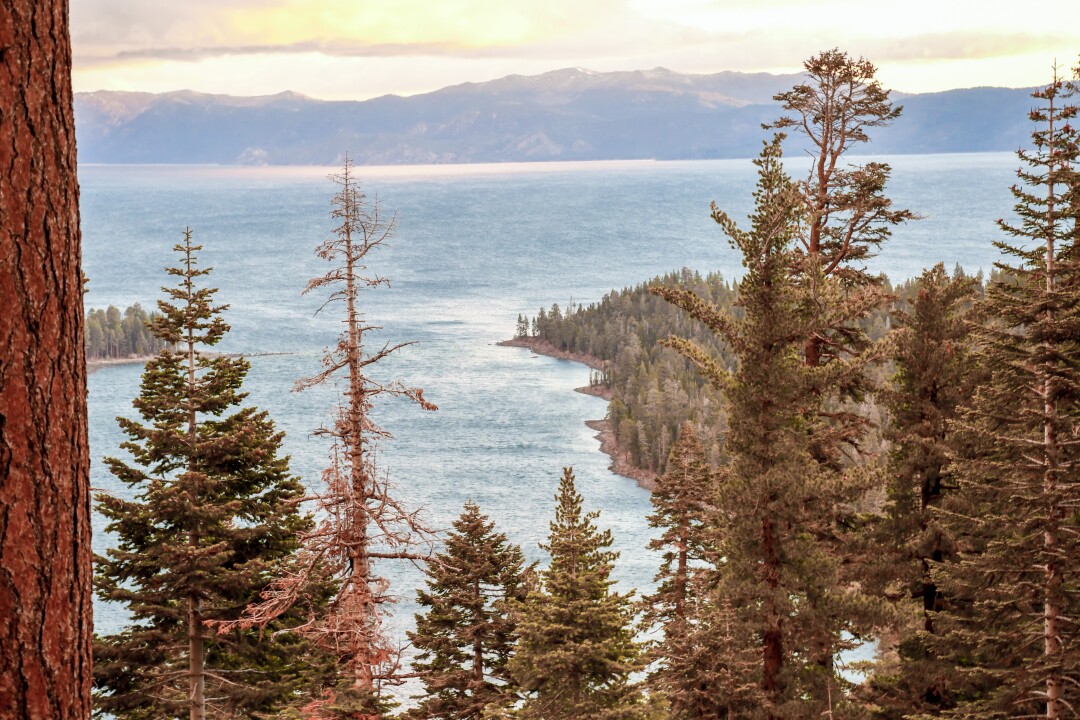
(Christopher Reynolds / Los Angeles Times)
There are no guarantees when you make an impulse decision on the road, but it’s good that I rose early to catch sunrise over Emerald Bay.

(Christopher Reynolds / Los Angeles Times)
As I arrived at Inspiration Point, the clouds burst and the sun appeared, peeking up from beyond the Nevada shore. Sunbeams and raindrops everywhere. Only a handful of families and individuals were there to see it. We shared smug smiles.

(Christopher Reynolds / Los Angeles Times)
Whatever season you arrive, make time for Emerald Bay State Park. Also, as you gaze across the water, consider that Lake Tahoe never freezes over. At its greatest depths, experts say, it’s 39 degrees year round.
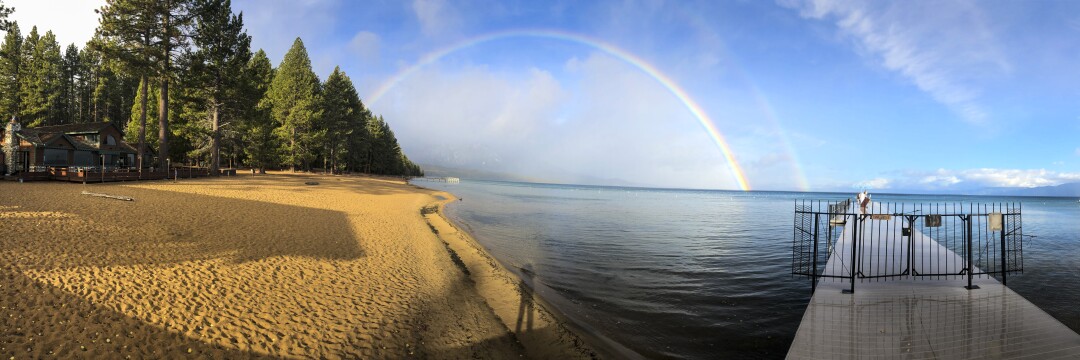
(Christopher Reynolds / Los Angeles Times)
More advice: If you stop by Camp Richardson on the south shore, perhaps to grab a bite from Beacon Bar & Grill, you might catch a rainbow rising from the water (and your own shadow).
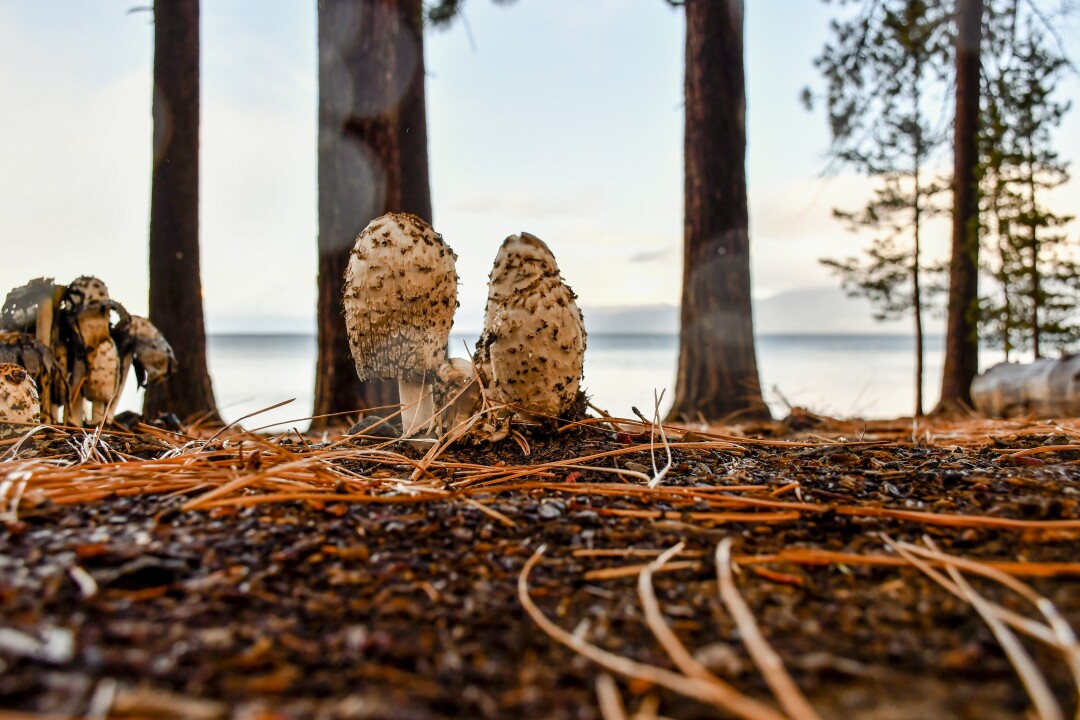
(Christopher Reynolds / Los Angeles Times)
Look down at Camp Richardson too. You might find mushrooms emerging from the cold, moist forest floor.


(Christopher Reynolds / Los Angeles Times)
I did take two detours from Tahoe. The first was onto Highway 50 between the hamlets of Meyers and Kyburz, about 20 miles south of the lake where some of the worst Caldor fire damage is visible from the road. I did this so that you don’t need to. Along the ashen slopes and roadside, workers were felling dead trees, then cutting, stacking and hauling them as civilian traffic slowly crept past. A man with a flag waved motorists through, then stopped traffic, then waved another batch through. If you’re driving to the lake from the south, it’s easy to avoid this by using Highway 395.

(Christopher Reynolds / Los Angeles Times)
Here’s another look along Highway 50. This ridgeline near Echo Summit was also part of the Caldor fire, which was reported Aug. 14 but wasn’t 100% contained until Oct. 21.
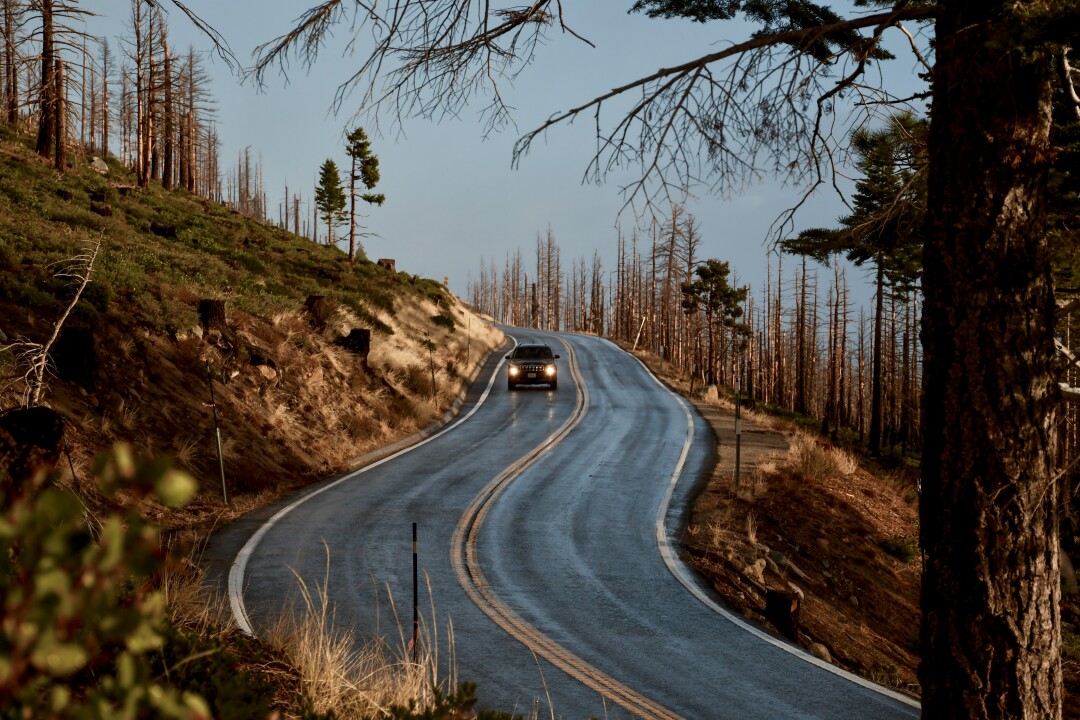
(Christopher Reynolds / Los Angeles Times)
These blackened trees and sparse slopes along Highway 89 might look like fresh damage, but they’re remnants of the Emerald fire of 2016, which burned fewer than 200 acres in a highly visible spot.

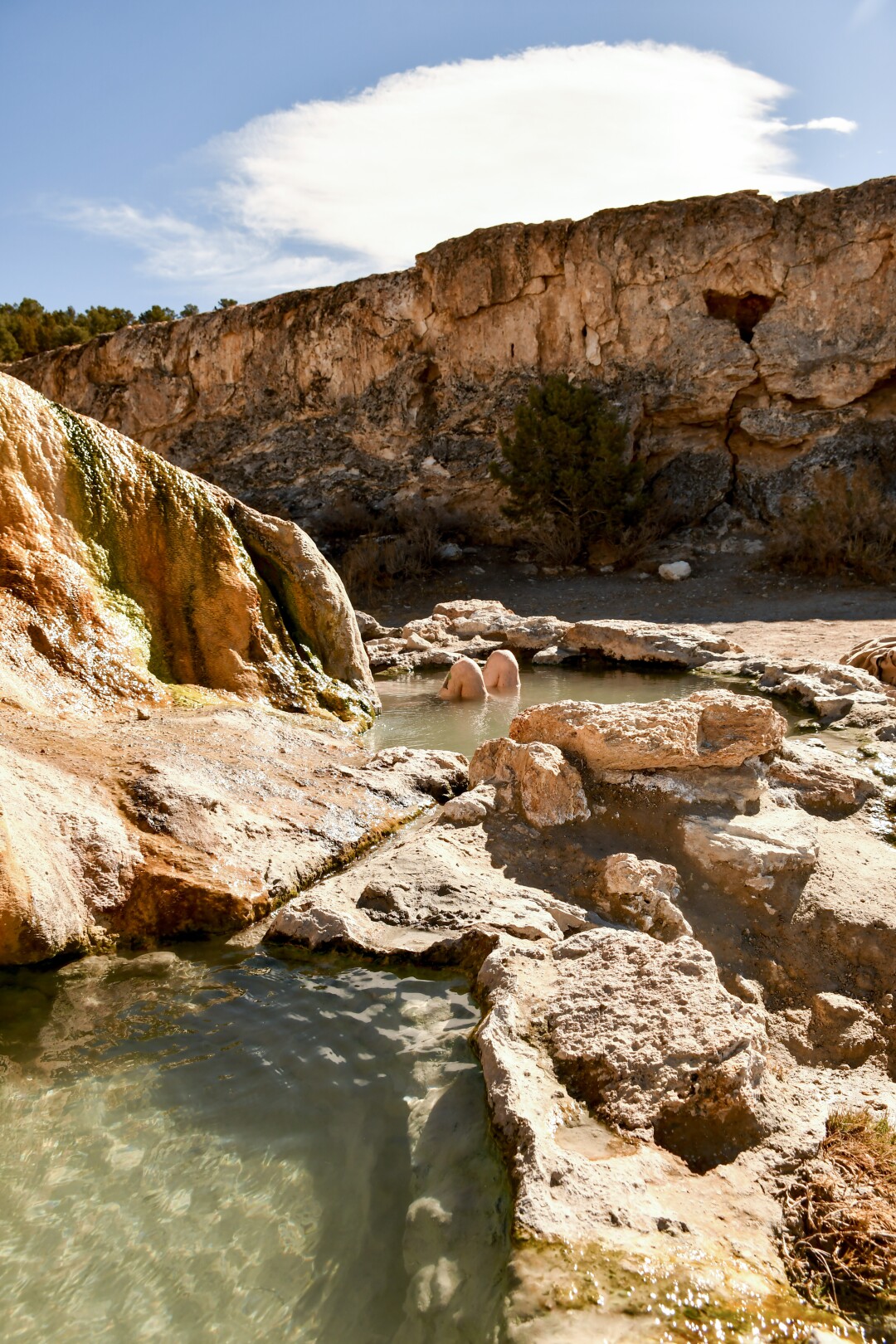
(Christopher Reynolds / Los Angeles Times)
See the knees? My second detour from Tahoe was a 100-mile side trip to Mono Lake, and on the way I stopped at Travertine Hot Springs. It’s off a dirt road just south of Bridgeport along Highway 395. In some of these natural hot tubs, you can adjust the temperature by placing pebbles to divert the incoming hot spring water.
The knees shown above belong to Opie Owens, 32, who was unwinding in one of the tubs after catching 13 Phish concerts in 16 days. He seemed to have his temperature just right.

(Christopher Reynolds / Los Angeles Times)
I pulled off my shoes and soaked for 15 minutes in a neighboring tub before hitting the road again. Owens wished me well and looked upon me with benign pity as if I’d just ordered take-away French fries in a Michelin-star dining room.
By the way, locals say the dirt road to these springs gets buried when serious snow comes. I wouldn’t try it in winter.
And on the subject of warnings …

(Christopher Reynolds / Los Angeles Times)
The decade is young, but I believe this is the most expensive gasoline I’ve ever pumped in these United States. This was Bridgeport.
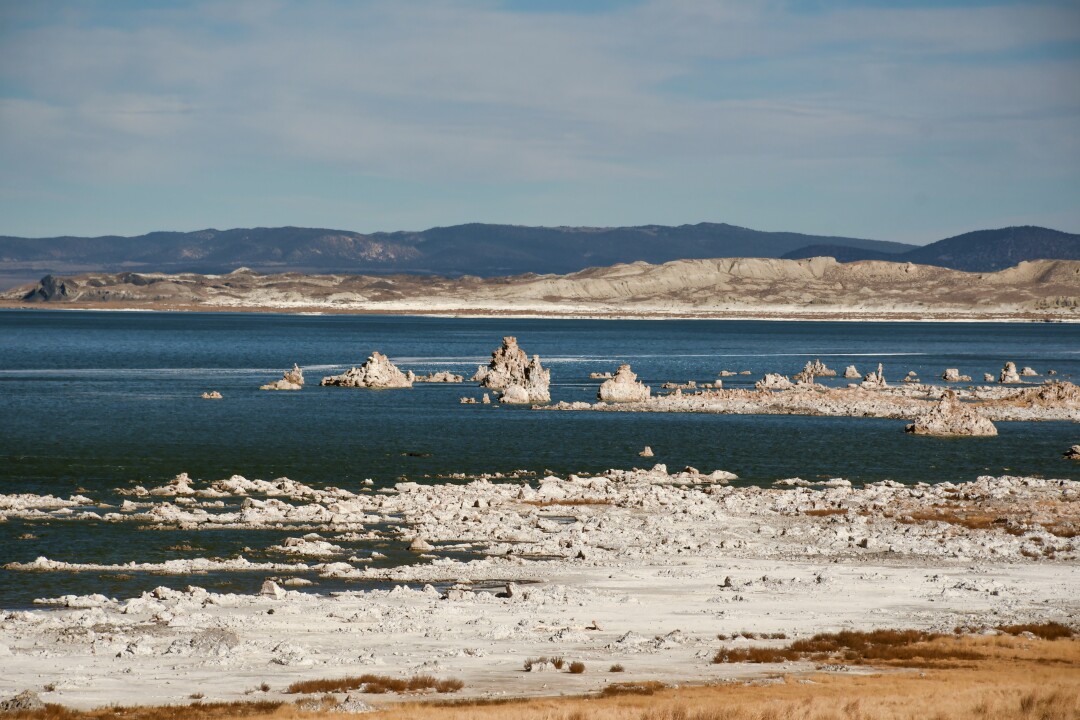
(Christopher Reynolds / Los Angeles Times)
Here’s Mono Lake, which every Angeleno probably ought to see because so much of our water has been diverted from its Eastern Sierra tributaries. The formations at Mono Lake Tufa State Natural Reserve are the stuff of strange dreams (and classic-rock album covers).
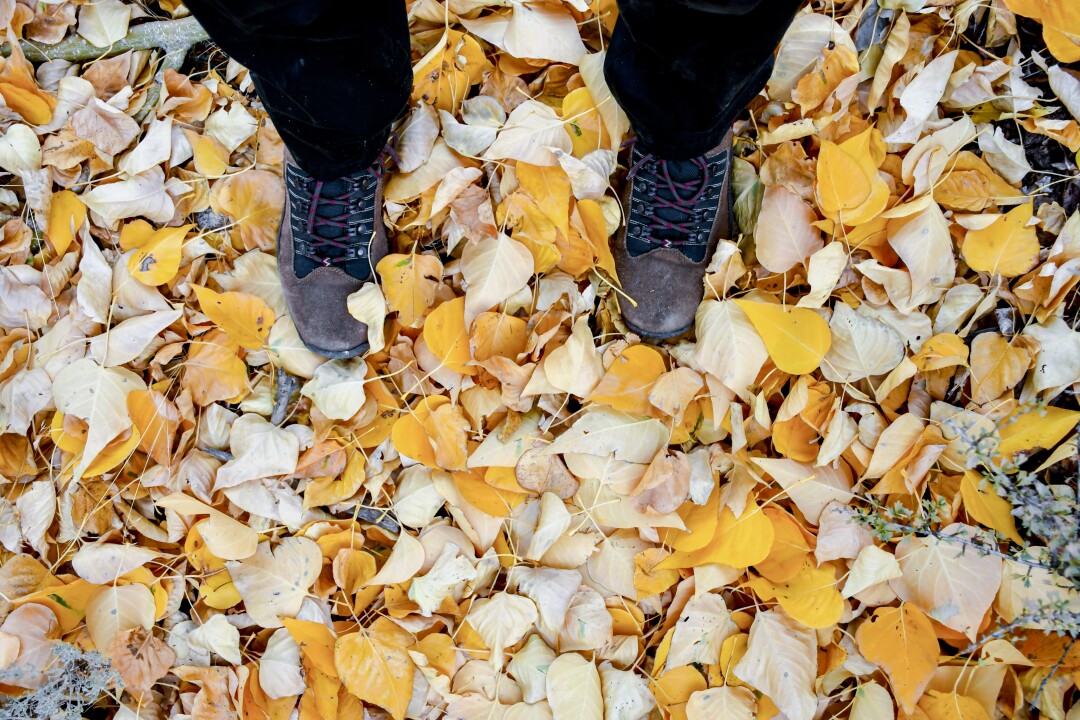
(Christopher Reynolds / Los Angeles Times)
Along the Walker River, between Bridgeport and Topaz Lake on Highway 395, I stopped just to tramp among the aspen leaves and granite boulders.
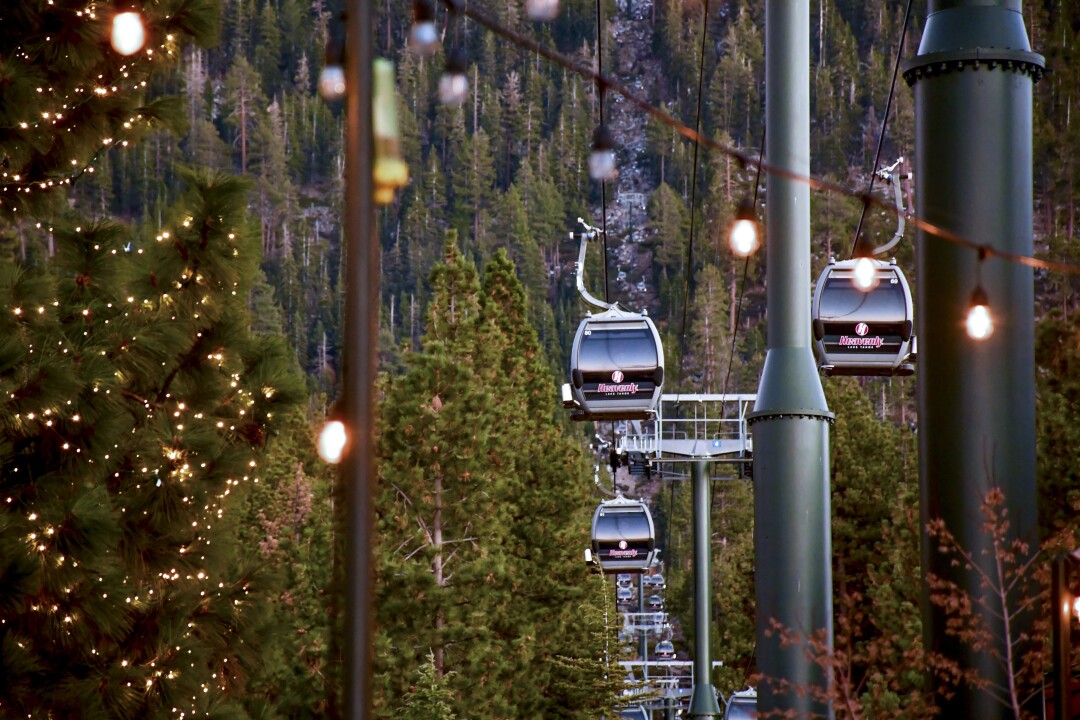
(Christopher Reynolds / Los Angeles Times)
If you start circling Tahoe at the south shore’s California-Nevada border, your first stop is the Heavenly ski resort and village. I did no skiing. After a mostly snowless November and early December, there was still no word on a resort opening date as of Dec. 8. (“Coming soon!” reads the website.) But Heavenly Village was stirring to life. I especially liked my dinner at Azul Latin Kitchen. Holiday lights were twinkling. All we lacked was snow. (As of Dec. 9, the gondola was carrying sightseers only, but on that day, a storm brought several inches of snow. Skiers, it won’t be long.)
The Sierra at Tahoe ski resort, 18 miles to the southeast, has deeper challenges to reckon with. Facing substantial fire damage, management has said that “we have set our sights on resuming operations in early 2022.”
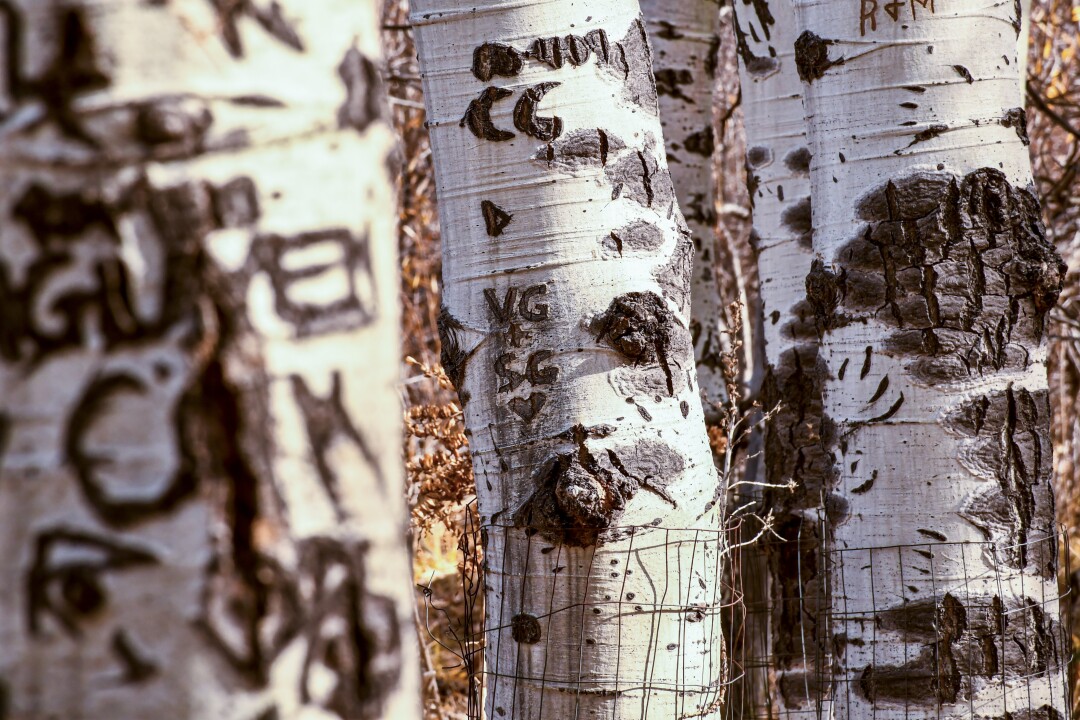
(Christopher Reynolds / Los Angeles Times)
The Taylor Creek Rainbow Trail, just off Emerald Bay road (Highway 89), was another impulse move. On the nature trail and boardwalk there, visitors can browse the wetlands and learn about the region’s falling aspen population. (Apparently nimrods with Swiss army knives aren’t the only problem.) But the big surprise was in the water.
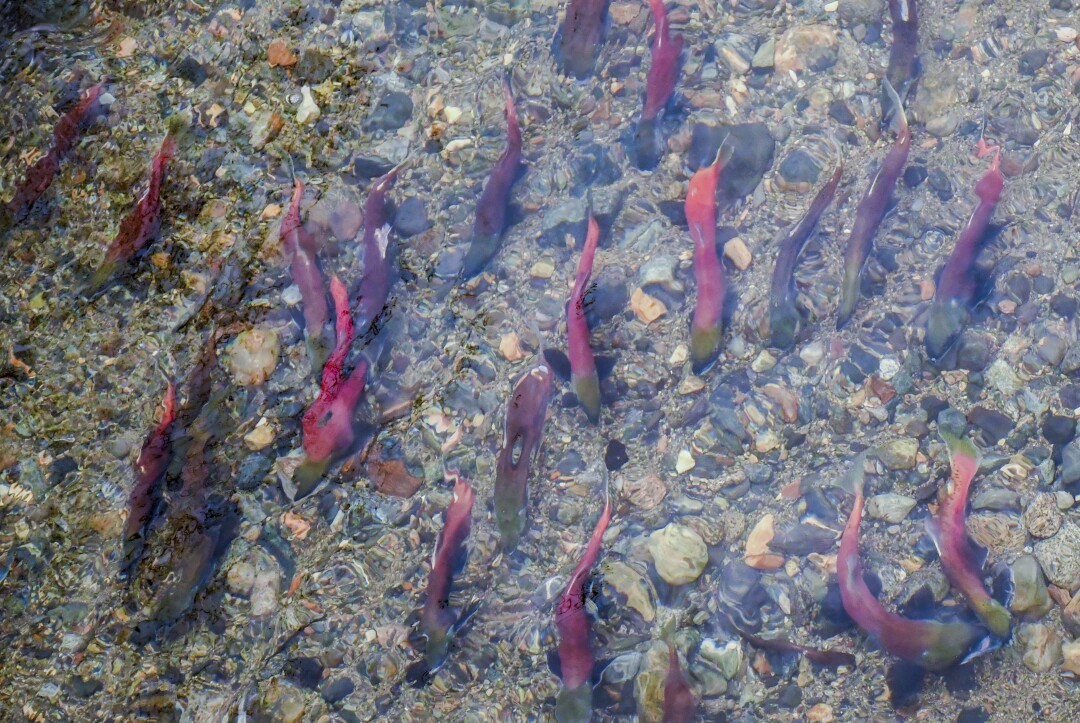
(Christopher Reynolds / Los Angeles Times)
Each fall, kokanee salmon spawn in Taylor Creek. It’s a phenomenon in which The fish turn red, struggle upstream to lay eggs — and die. I showed up in the middle of this epic struggle with thousands of red fish (and dead fish) everywhere, accompanied by the scent of fresh salmon.
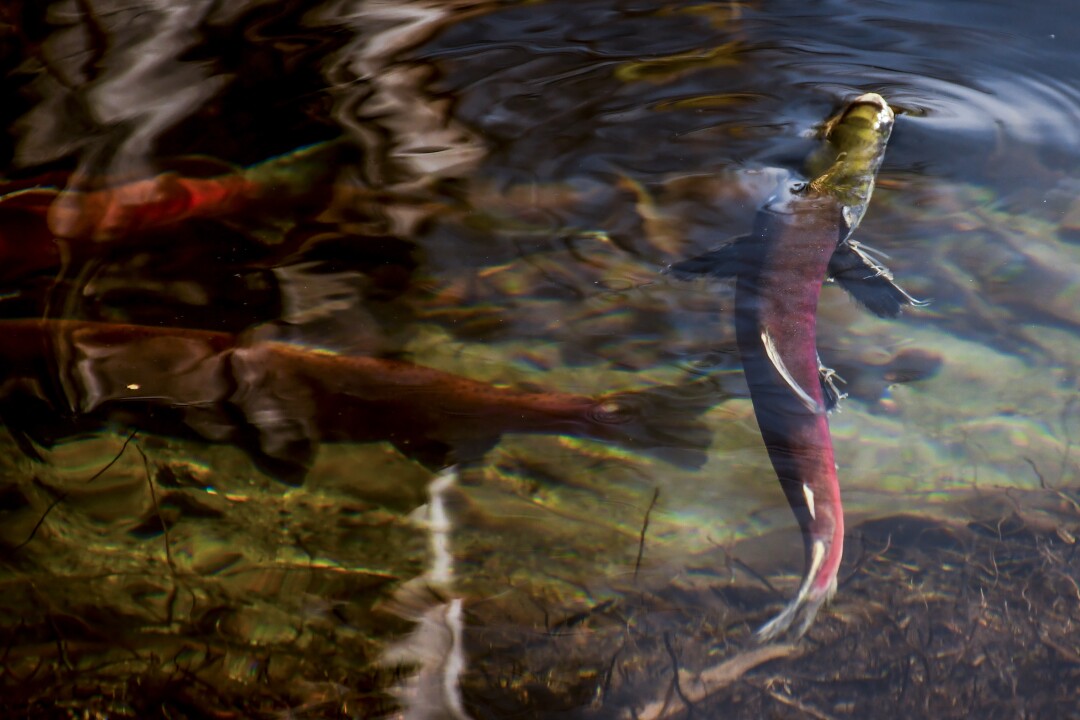
(Christopher Reynolds / Los Angeles Times)
It was a bittersweet spectacle of nature in transition. I probably shouldn’t admit that it made me hungry.
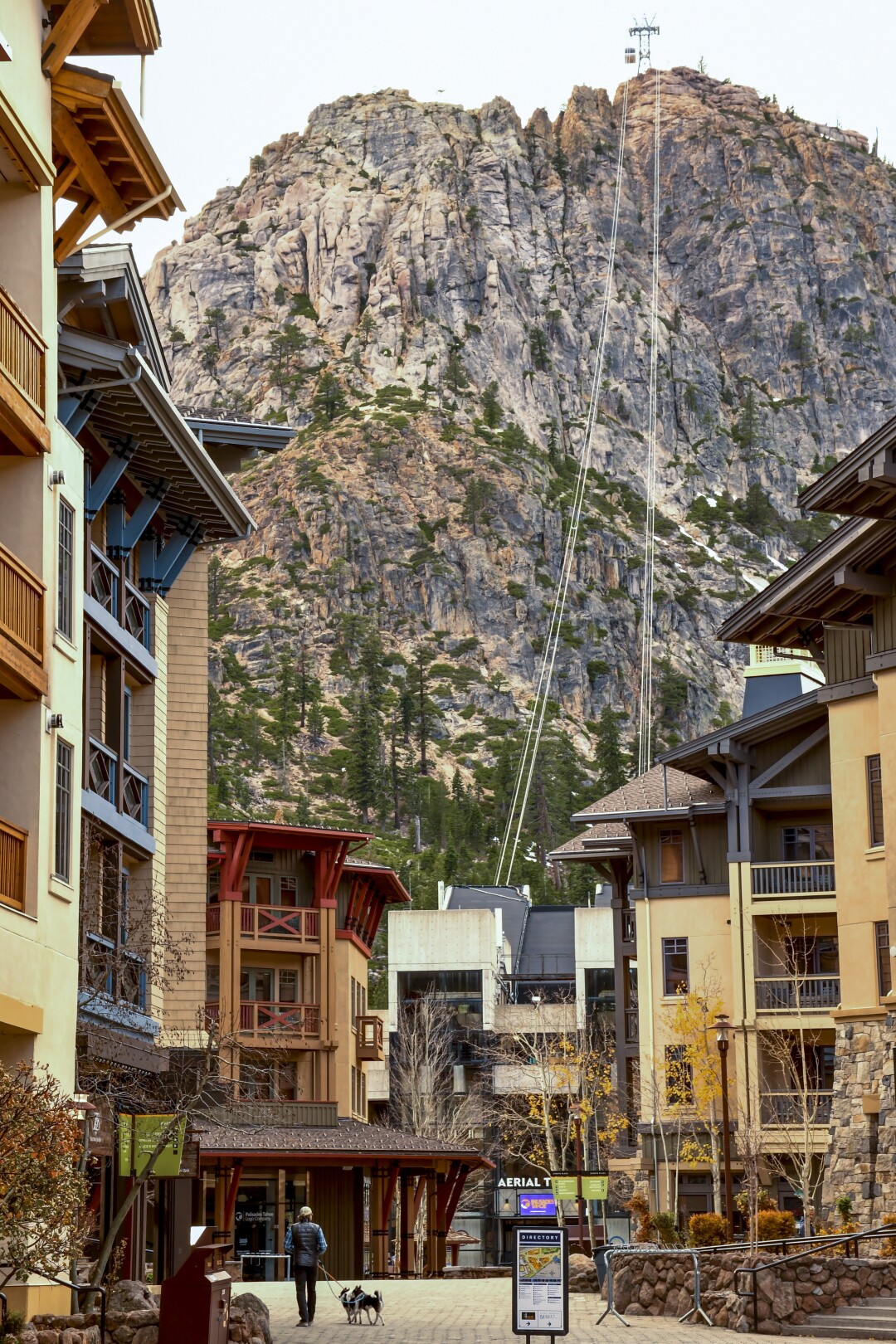
(Christopher Reynolds / Los Angeles Times)
About seven miles from the lake’s north shore, I spent a night at the Palisades Tahoe ski resort, which you may know under another name. It was Squaw Valley until September when management cast off the old name, acknowledging it was derogatory and offensive.
There I wandered through another slowly waking resort village, this one more isolated than Heavenly, with only a few restaurants and shops open. For company, I had a naked mountain — the granite formation known as Tram Face looming to the west (soon to be covered by snow, let’s all hope). In recent days, more of the village has opened, and the resort has its beginner terrain in operation with lessons available. The resort’s aerial tram is running Friday through Sunday but only for sightseeing so far.
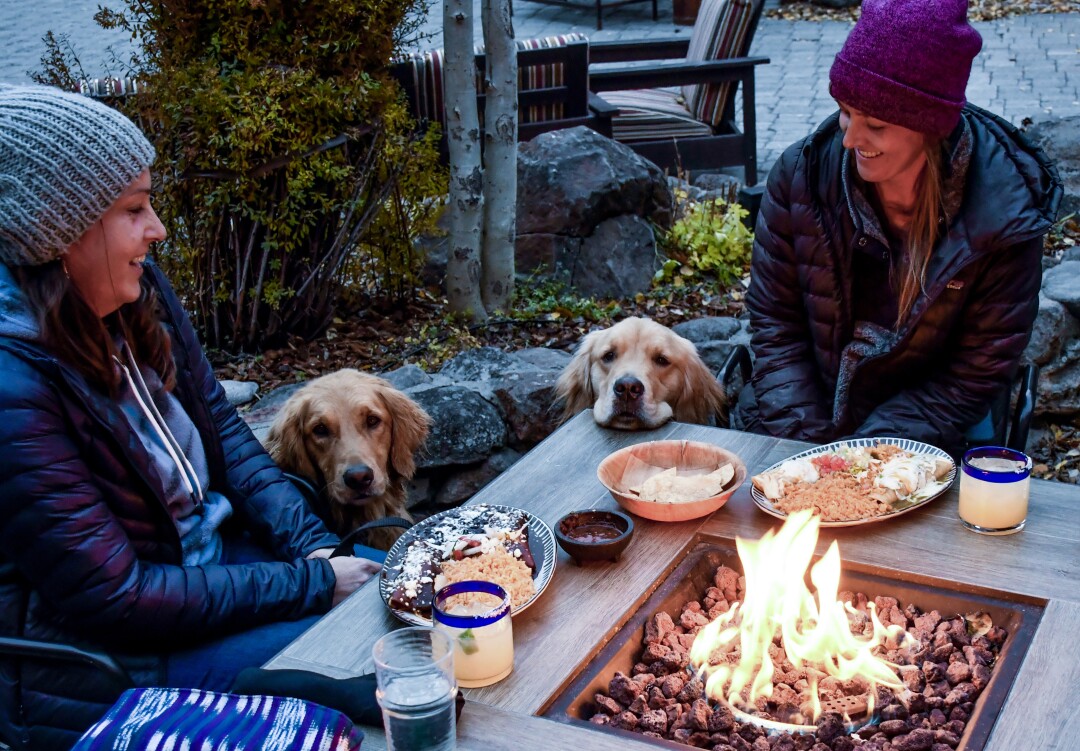
(Christopher Reynolds / Los Angeles Times)
In the Palisades Tahoe village at one of Tremigo restaurant’s fire pits, I found Cathy Colpitts (gray hat) and her golden retriever K.T. along with Danielle Ginty (purple hat) and her golden retriever Rosie.
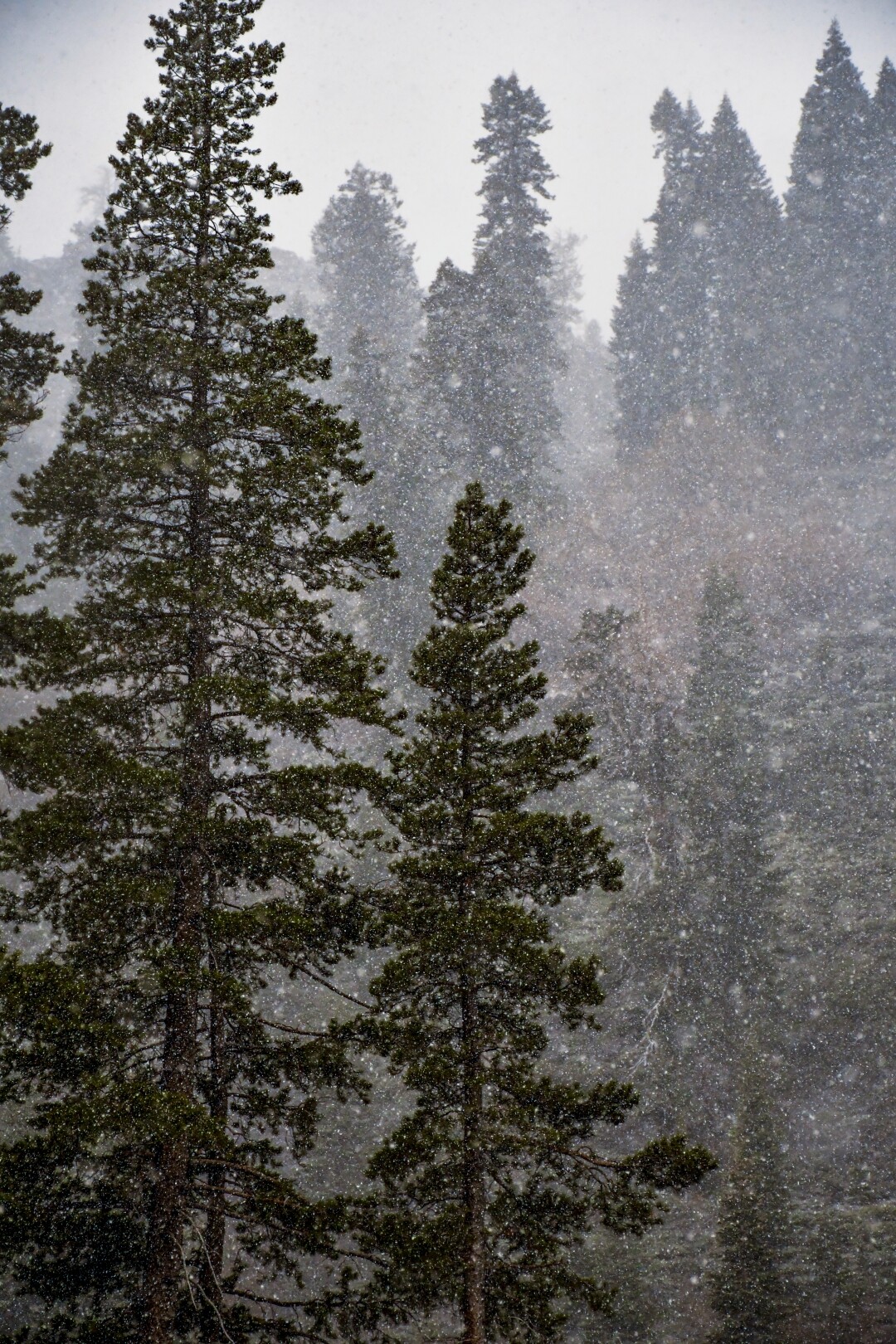
(Christopher Reynolds / Los Angeles Times)
In the Alpine Meadows area of Palisades Tahoe, I caught a few minutes of snow — a hint of the winter to come. By the time I was a few miles down the road (and a little closer to sea level), the flakes had turned to rain.
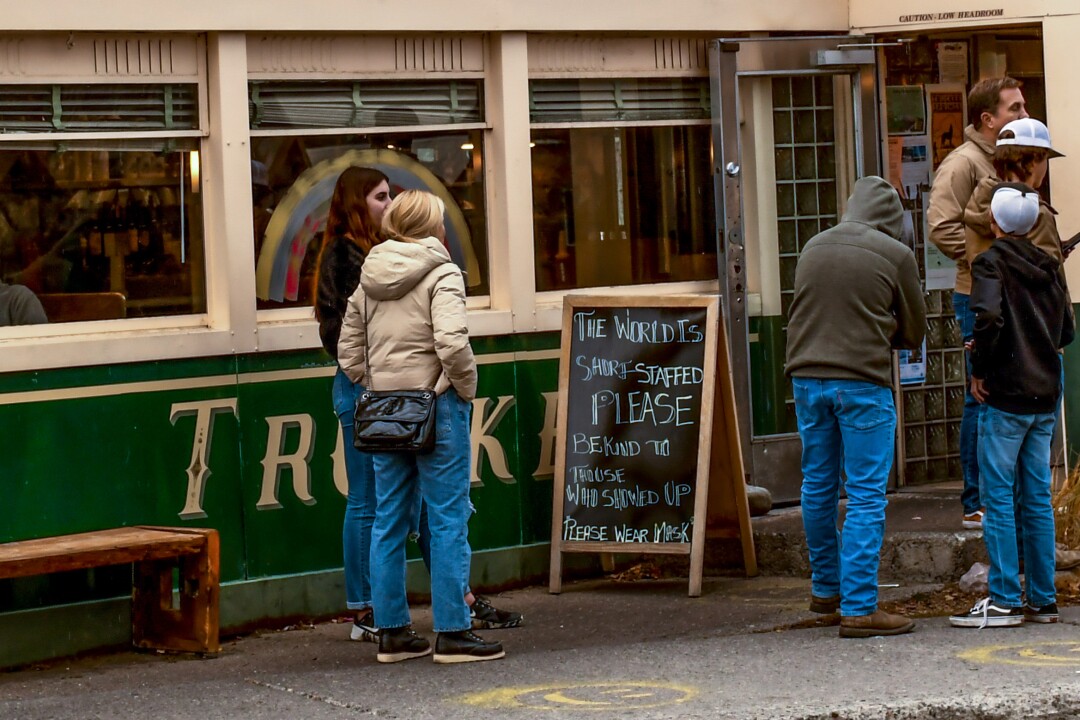
(Christopher Reynolds / Los Angeles Times)
Truckee, an old railroad town near Lake Tahoe’s north shore, has been born again as a destination for tourists and Bay Area people with second homes. Like every other community around the lake, it’s punctuated this year by signs reading not only “THANK YOU, FIREFIGHTERS” but “HELP WANTED” because a pandemic-fueled housing shortage has made it difficult for service workers to find anywhere to live. Hence this sign at JAX at the Tracks Diner: “The world is short-staffed. Be kind to those who showed up.”
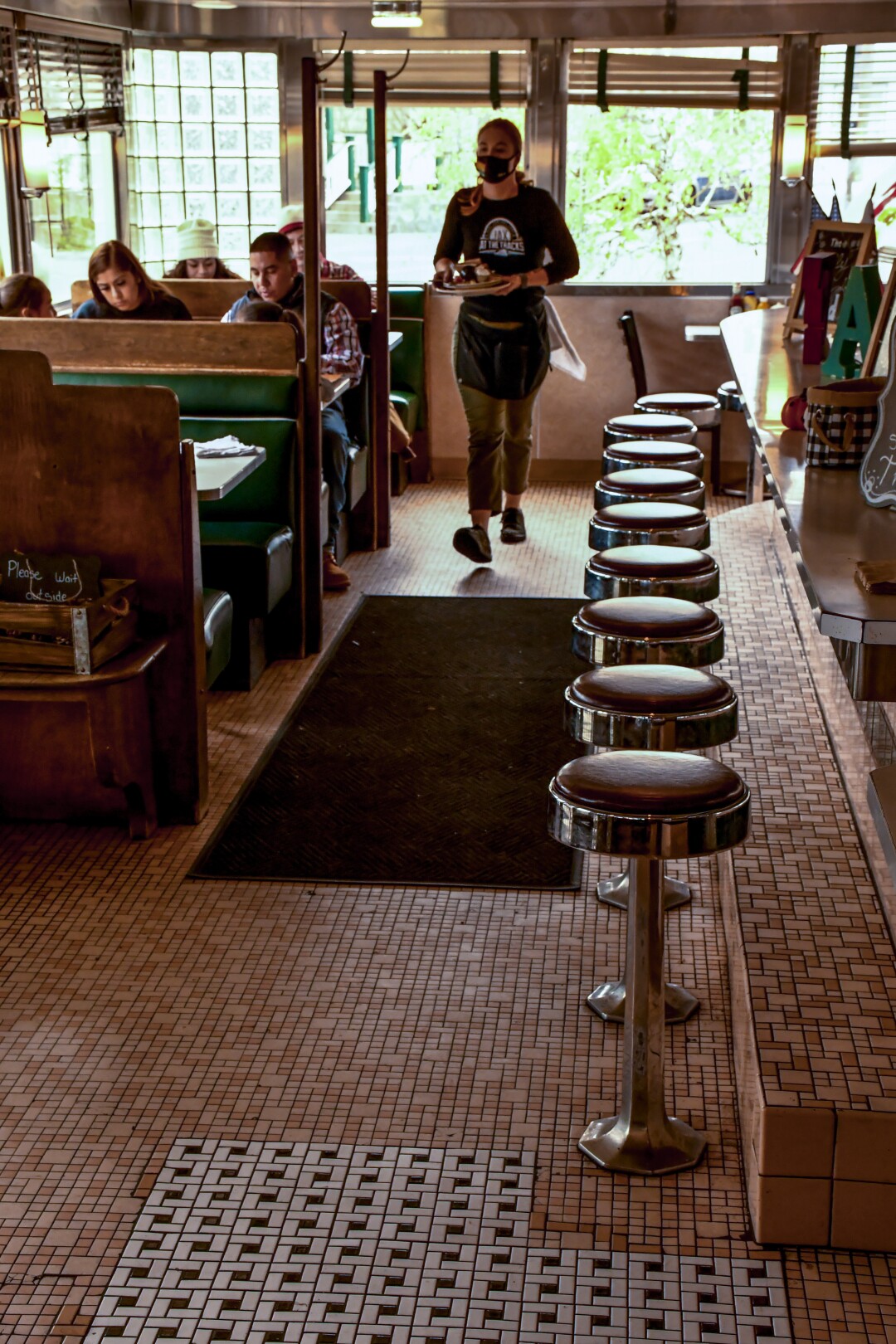
(Christopher Reynolds / Los Angeles Times)
JAX is one of the most popular restaurants in Truckee, but its counter seats were all empty because of COVID precautions.
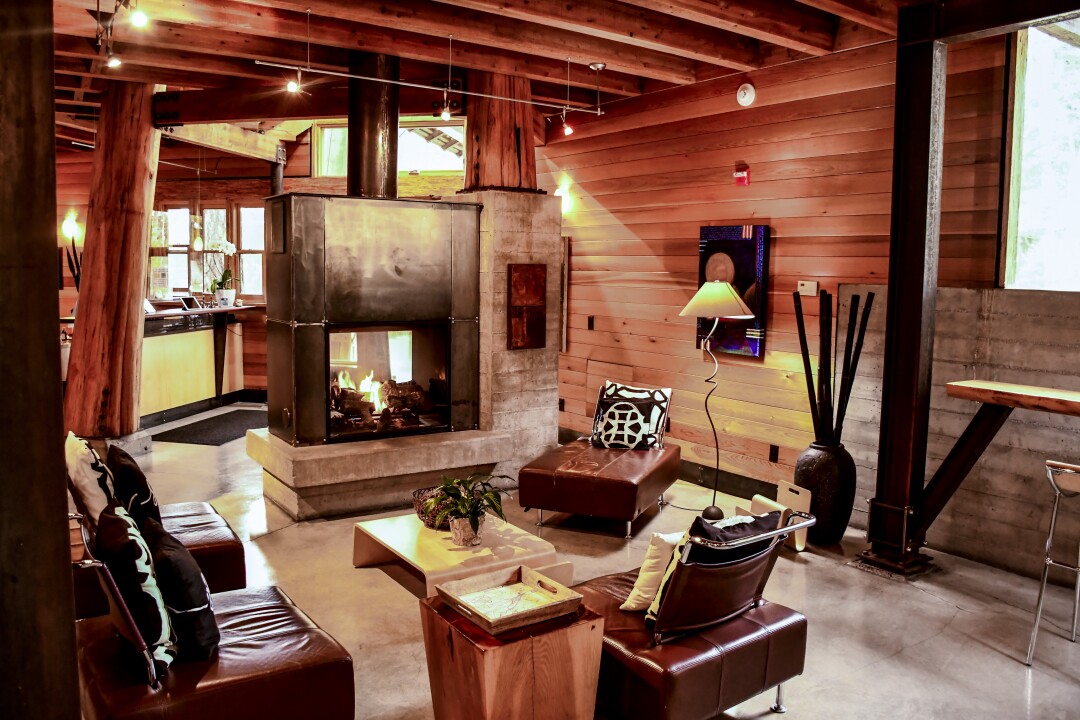
(Christopher Reynolds / Los Angeles Times)
You see a lot of real and fake log cabins around the lake. You don’t see a lot of structure likes the Cedar House Sport Hotel in Truckee, whose style is part cabin, part industrial chic. It’s the marriage of cedar and cement at last. The hotel has 40 rooms and a well-regarded restaurant, Stella, and it was my favorite lodging find of the journey. (I paid about $175, but once the skiing season starts, rates jump much higher.)
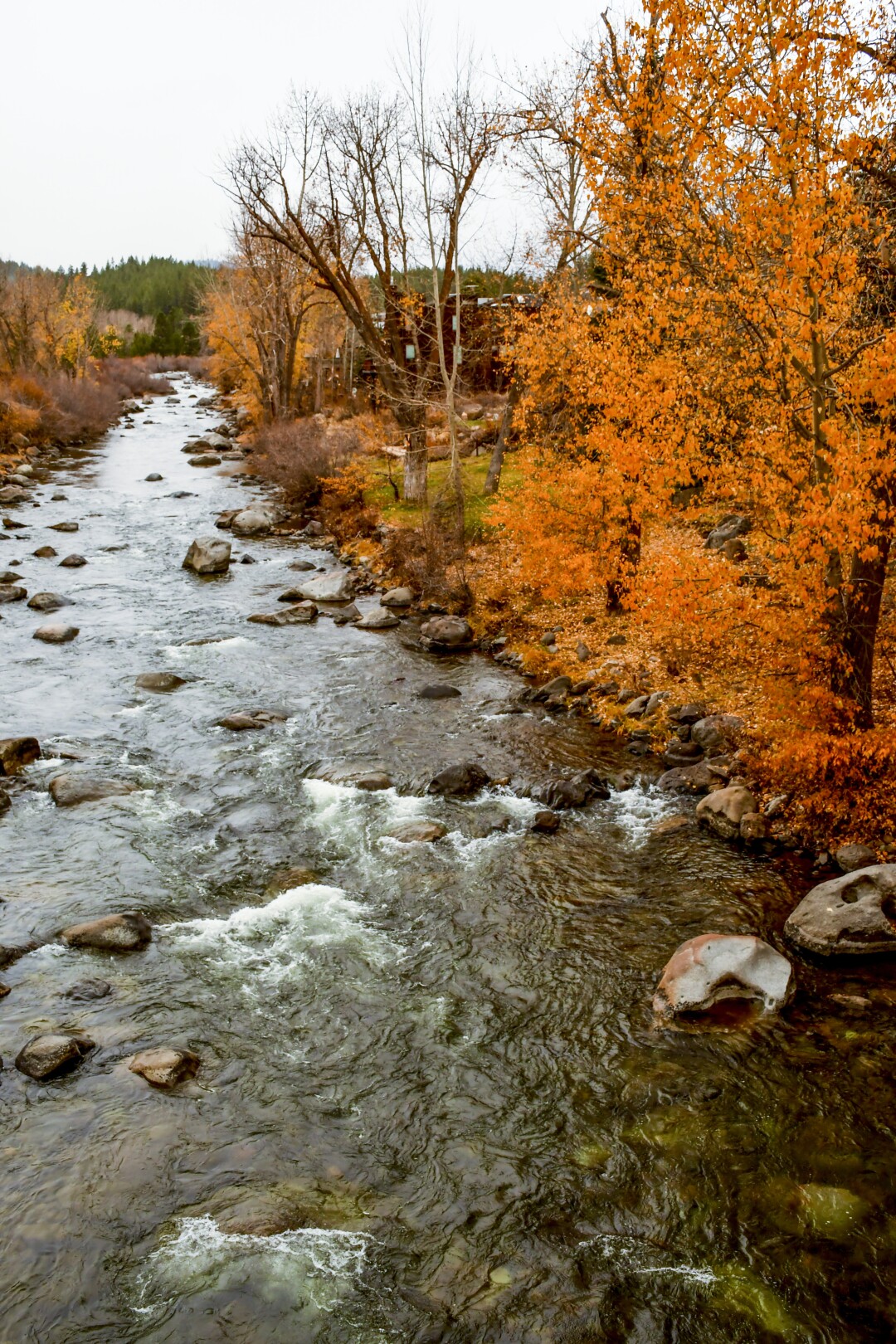
(Christopher Reynolds / Los Angeles Times)
One great pleasure of driving River Road (Highway 89) north from Tahoe City is the way you play peekaboo with the Truckee River, Lake Tahoe’s only outlet.
It runs north from the lake, cuts through downtown Truckee (where I took this picture). Then, with Interstate 80 following its path, it continues for another 80 miles or so, twisting through Reno, then emptying into Pyramid Lake, Nev. Maybe come spring that will be the next road trip.
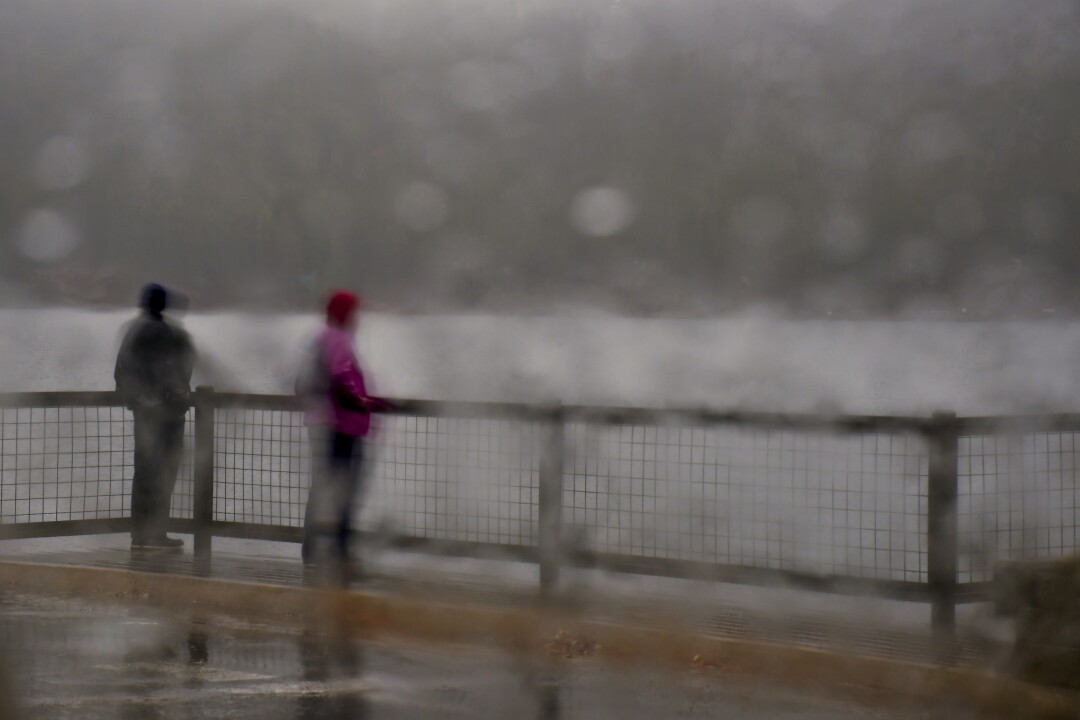
(Christopher Reynolds / Los Angeles Times)
On the last afternoon of the Tahoe trip, under pounding rain, I pulled over at Donner Lake, a few miles from the mountain pass where the Donner Party had its winter unpleasantness 175 years ago.
Everyone else had taken refuge inside except these two, who lingered a long while, watching the stippled surface of the water. Maybe they were thinking about how rough 2021 has been or how much they’re counting on 2022. Or maybe they were reminding themselves that in this neck of the woods, just about any year that isn’t 1846 is a good year.






